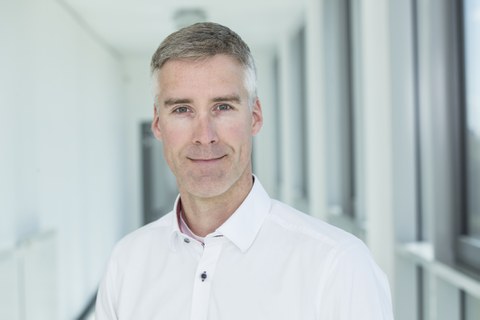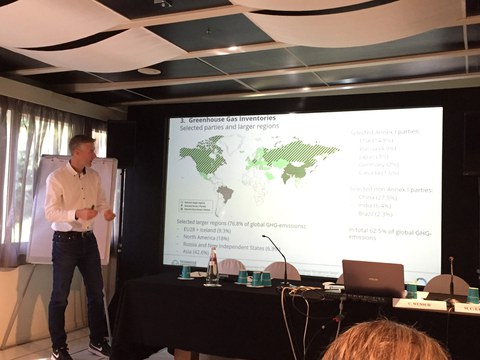"I wanted to become an engineer and study something related to the environment. I never really intended to become a professor."
(surveyed in 2024)
Table of contents
- Why did you choose this degree program and why Dresden?
- Where are you employed today and what do you do?
- What does a typical working day look like for you in three sentences?
- How did your career start go? When did you know which area you wanted to work in?
- How did you enjoy your studies and how does it help you in your professional life?
- A degree course or professional career is rarely straightforward: what crises or hurdles did you face and how did you overcome them?
- What advice would you give students of your subject from today's perspective?
- What do you particularly remember about your time at university?
- Where was your favorite place at the university? And why?
- You can't have studied in Dresden without...
| Profile of: | Christoph Wünsch |
| Degree program: | Waste Management and Contaminated Site Treatment |
| Degree: | Diploma |
| Study period: | 10/2001 - 10/2007 |
| Current activity: | University lecturer |
Why did you choose this degree program and why Dresden?
I wanted to become an engineer and study something related to the environment. The Waste Management and Contaminated Site Treatment degree program was a very good fit. Dresden was far enough away from my parents' house that I didn't have to deal with them all the time, but it wasn't too far away to be able to travel home every weekend if necessary. In addition, Dresden is/was undoubtedly a beautiful city and the cost of living was reasonable.
Where are you employed today and what do you do?
I am a professor of environmental technology/waste technology and emissions at the university in Merseburg.
I mainly teach on the bachelor's degree courses in "Chemical and Environmental Engineering" and "Green Engineering" and the master's degree course in "Sustainable Process Engineering and Chemistry". In addition to waste and recycling management topics, I am now also able to deal with many other aspects of environmental engineering and am becoming more and more involved in the fields of process engineering and chemistry.
What does a typical working day look like for you in three sentences?
Depending on the weather, I drive the 25 km to the university by car, motorcycle or bicycle and then start my working day between 8 and 9 am. Depending on whether I have courses to teach or not, I have to take care of them first or work through emails. As a professor at a university of applied sciences, I'm very involved in teaching and am allowed to read and assess a lot of protocols, term papers and theses or prepare and follow up on courses. I also work on a few smaller research projects on the side.
How did your career start go? When did you know which area you wanted to work in?
After completing my studies, I initially started working as a Research Associate. Within this super interesting and varied job, I did my doctorate and finished it with the defense of my doctoral thesis. This is one of the prerequisites for being appointed as a professor. I never really intended to become a professor. But when a suitable Chair was advertised in my "old" home country, I applied for it and, with a bit of luck, was able to beat the other applicants.
How did you enjoy your studies and how does it help you in your professional life?
At the time I was studying, there were still diploma courses in which you didn't have too many lectures, especially in the later semesters, and were able to focus more on project work and work placements. That really helped me, at least, to get involved with scientific activities during my studies. It was therefore reasonably easy for me to start my professional life, initially as a Research Associate.
A degree course or professional career is rarely straightforward: what crises or hurdles did you face and how did you overcome them?
As with most students, there were subjects/modules during my studies that I found quite difficult. I regularly didn't pass exams/examinations the first time. But I stuck at it and always managed to concentrate on studying when it was absolutely necessary and ultimately finished my studies with a good grade.
In my professional life, too, there were/are small setbacks from time to time. But that's part of it and I didn't let it discourage me. The important thing is to be willing to keep learning and to gradually get better and better.
What advice would you give students of your subject from today's perspective?
Don't memorize everything, but try to understand the context. Memorized material is usually quickly forgotten and can be read up on at any time. Deriving and understanding connections is what you need in most professions and helps you to solve problems. Good or very good grades usually don't hurt, but are of secondary importance for success in professional life.
What do you particularly remember about your time at university?
The semester with the environmental field and laboratory internships in Pirna. In my opinion, we learned the most as students during that semester. We also had a lot of fun in the afternoons and evenings due to the somewhat remote location and the proximity to the Czech border.
Where was your favorite place at the university? And why?
The beer bar in the "new canteen". It no longer exists, but all older former students know it very well. It was almost a duty to go there after every exam and discuss the exam content over two or three beers.
You can't have studied in Dresden without...
getting to know the student club scene.


